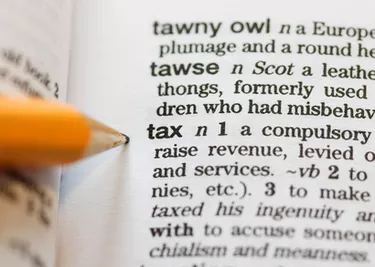
A sales tax is a levy or special fee charged on products and services by retailers and service providers on any monies collected from sales. Sales tax includes state, county and local taxes, and in most cases, constitutes a certain percentage of cost passed onto the consumer. Sales tax does not constitute revenue to the seller, rather is a duty of the seller to collect it and pass it to the authorities.
What is the Purpose of Sales Tax?
Video of the Day
Economically, sales tax is actually excise tax. This comes from the fact that the sales tax is directive towards the end user rather than the seller. Excise taxes are typically charged on items that are not considered necessary for survival, such as alcohol and cigarettes. Much closer to consumption and transportation taxes, sales tax becomes an indirect tax since it is embedded into the purchasing price.
Video of the Day
Sales tax is also a net tax since only during the calculation of tax payable is net revenue realized. Because of this, it is considered a transitory item by many traders since during the procurement process, they are able to charge for the value added tax (VAT).
No matter what the legal framework is, the fact is that sales tax is a difficult tax to evade, as the tax is collected by merchants on behalf of governments at the point of sale. The only way consumers can avoid it is to shop exclusively in one of the five states that charge no sales tax. Most sales tax revenue goes to the local government's general fund.
Types of Sales Tax
The three general types of sales taxes are seller or vendor privilege taxes, consumer excise taxes and retail transaction taxes.
The seller or vendor privilege taxes are those in which the retailer absorbs for being permitted to make retail sales within the state; the retailer can either absorb these taxes or pass them onto the final consumer. Consumer excise taxes, however, are absorbed by the final consumers and sellers solely act as agents of the state to collect these taxes. Lastly, retail transaction taxes are hybrids of the first two in which both sellers and purchasers are liable for the payment of these taxes.
From an operation standpoint, since sellers can pass their taxes onto the consumer, retail operational taxes become similar to the consumer excise tax.
Taxable Event Is the Sale
In sales tax, the taxable event is the retail sale. Each state has a general sales tax. Retail sales do not consist just of purely cash sales. These could also constitute credit sales, conditional sales, trade-ins or any other commodities exchanges.
The best way to avoid ambiguity on what ought to be taxed is to look at the aim of the transaction. If the main intent is to acquire a property or service, then a sales element is considered and thus taxable.
However, there are exceptions to this rule. For example, most states do not levy sales tax on grocery food items. A tax professional should be consulted when there is lack of clarity as not all states recognize the true object test.